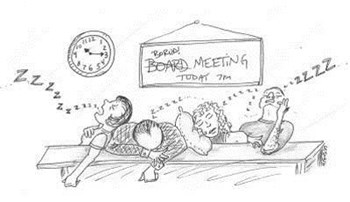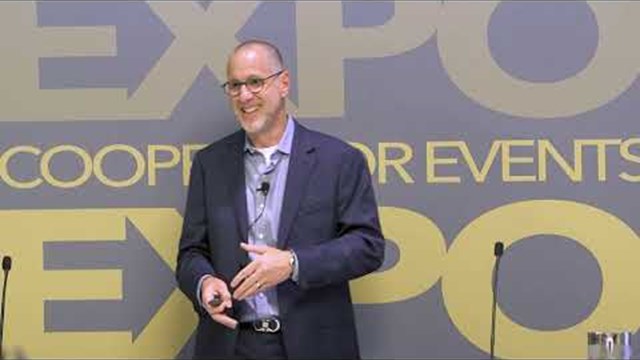
Ever feel like your board meetings last longer than Wagner's entire operatic Ring Cycle? They may not last nine hours, but even three hours is a long time to sit in a chair—especially when the agenda doesn't include the Flight of the Valkyries and there's no intermission to go get a soda and chips. The sentiment is usually something like, "We're all working, we're all busy, and we're all volunteers—so let's get this show on the road!"
Many board members and shareholders come to dread the monthly board meeting or annual shareholders meeting. Some report meetings drag on for hours, others feel that they're exercises in wasted time, and still others watch their meetings devolve into pointless shouting matches, complete with name-calling. A dysfunctional or non-existent meeting plan can be especially intimidating and demoralizing for a brand-new board member who may feel like a fish out of water to begin with.
Time Consuming Factors
"Everybody comes with the best of intentions," says David Baron, of Metro Management in Long Island City, a firm that manages about 16,000 apartments. "The problem is that many people are coming from work, so they are tired. Often they have not eaten. The meetings often run late, and sometimes they run off track, meaning they deviate from the agenda, or something related comes up. By the 9:30 hour, if you have started at 7:30, everybody is hungry and tired."
When a board member is late, the meeting gets off to an immediate sour start. People don't like to be kept waiting, especially if they are tired and hungry. Often it can't be helped, like when a traffic accident keeps someone sitting on the highway and unable to move, but sometimes people don't leave adequate time to arrive promptly, and that can lead to resentment before the meeting even gets underway.
"The biggest problem I find is that a lot of people are very busy with their work and their own personal lives," says Baron—which is the way it should be. After all, no one is being paid to sit in a board meeting.
Proper Preparation
The very best way to ensure that meetings both start and end in a timely fashion is to be prepared, says Baron. "We will work with a board president to prepare an agenda and list of attachments, and then we will try to circulate it to the other board members in advance of the meeting. This way when they come to the meeting, they have read the attachments, the proposals, and the correspondence. We always try to deliver the minutes in advance of the meeting so that they have already read them, and can approve them without having to use valuable meeting time by reading them aloud."
"You have to be very efficient," says Anton Cirulli, general director of Lawrence Properties in Manhattan. "You have to have an agenda, and it has to be written out so that all the board members know what to expect from the meeting. There will be old business and new business. If you have an agenda and you know where you are going, you can have a beginning, a middle, and an end."
Some parts of the board business do not have to happen while the group is gathered, and being prepared is not only the president or manager's responsibility. Baron recommends "Anything that we can do to optimize the time. Reading minutes, agendas and correspondence for the first time can bog down meetings. If you do a lot of that preparatory work in advance and get it to them a weekend prior, or two nights prior to the meeting, then meetings tend to flow a lot quicker and end in a more timely fashion."
Personal lives and an aversion to sitting in a chair for long periods are not the only reasons for wanting to keep meetings on the shorter side, says Baron. "Most meetings start at 7:30. They usually run till 9:30 or 10, and when they run beyond that, you tend to lose productivity."
During The Meeting
Getting everything ready beforehand may not be the only solution to keep meetings from dragging, however. Once the meeting has begun, there may be new hurdles to conquer. "Sometimes there will be topics that get people's dander up," says Baron. "There are certain topics that are agitating at meetings. It varies by building. If the entire board doesn't agree with the utility of a project, you will have competing interests. Discussions will extend the length of the meeting any time you have competing interests and you have people who are not unanimous in their resolve."
Just as money can separate friends and partners, it can often be at the root of the board's troubles. Baron cites several potential money issues: "If there are maintenance increases you have to discuss mid-year; if there are arrears; if cash is a problem; and then, sometimes there are people who just like to argue. It can be any number of things."
Enid Hamelin, also of Lawrence Properties, agrees: "When you start to run into trouble is when you have a gray area over finances, or how to raise money for large capital improvements. Should they be assessing the shareholders? Should they dip into their line of credit? Then there are issues of redecoration—anything emotional where people respond from the heart rather than logic. Color or style will cause a debate."
Money and design are not the only topics that stump boards, says Cirulli. "Most meetings get sidetracked by details that may not be necessary. They may get sidetracked when people start to talk about what other buildings in the neighborhood are doing."
Often boards will require the advice of an expert or the testimony of a shareholder, and this, too can add time to the length of a meeting, says Hamelin. "These are items that the board is less familiar with, where you have to rely on the experts, like roofs or structural things, that can really bog down a meeting. Here again, having a written agenda really helps move things along."
Ways to Shortcut
So what can be done? The experts have a few suggestions: "Making the gray area more black-and-white is the answer to the endless debate," says Hamelin. "Making a deadline will create a sense of urgency and often will be the best tool to keep the discussions from going around in circles."
"Stick to the facts," adds Cirulli. "When people start to detour, bring it back to the facts."
Sometimes a minor tangent will resolve itself, and sometimes it won't, says Baron. "Sometimes the discussion will run its course after a couple of minutes. If not, after a few minutes of deviation from the agenda, the discussion will need to be brought back on track." It falls to the president or the managing agent to restore the meeting to its proper course.
Another method of maintaining order and structure is the use of parliamentary procedure. At first glance it might seem like a burdensome way of going about a meeting that is often much less formal, but a board is a governing body, and Robert's Rules are the basis of how we instinctively conduct meetings. You may not realize it, but you are invoking Robert's Rules when you second a motion. These guidelines can be adapted for any type of meeting or convention, and can be consulted and implemented, if meetings are consistently getting out of hand.
"A lot of boards try to conduct themselves in a manner that is consistent with Robert's Rules of Order," says Baron. "Many boards do not —they simply conduct themselves with decorum and respect and people are allowed to speak and votes are taken."
Other Factors
Board/ shareholder interactions can be greatly influenced by the size of the building, which can affect the board's meetings, says Baron. "In very small buildings, it's more of a neighborly camaraderie, because in a 10-unit building, everyone is on the board. It's easier if the building is larger, because they are able to be more objective, not knowing everybody. If you are in a building with 1,250 apartments, you won't know all your neighbors."
Whether the meeting is open to the shareholders at large is another factor that may affect the length of the meeting, especially in larger buildings where there is an issue that sparks a debate. If meetings run too long, everyone who wishes to speak may not get the chance. There are also issues that may not be prudent to discuss at an open meeting.
"Human nature is to be more cautious in an open meeting, an open forum," says Baron. "You want to respect people's confidentiality. Arrears cases, for example, are discussed in closed session."
Board members should bear in mind, however that every shareholder has the right to give input into how things are done in their community. "You should be allowed to speak freely at an annual shareholder meeting," says Hamelin. "You own shares in a mutual investment."
One solution is a compromise, of sorts. "Depending on the building, many buildings will have an open session, for half an hour, for example, and then the meeting will close for an executive session," says Baron.
Not all meetings are created equal, says Hamelin. "The board meetings are business operations, whereas the committee meetings are more volunteer, in tone. They are much more loosely conducted and not subject to the same rules and expectations. They can last as long as it takes to come to a recommendation or conclusion on whatever topic they are formed to tackle."
Final Guidelines
If your board meetings are in need of an overhaul, consider these recommendations from Baron: "Prepare the agenda in advance with all the attachments. Distribute them before the meeting. Always have something to eat or to drink, such as chips, cookies, or soda. Set time limits. If you are sitting in a room for four hours, there is something wrong. A productive meeting should last no more than two to two and half hours."
Denton Tarver is a freelance writer and a frequent contributor to The Cooperator.









Leave a Comment